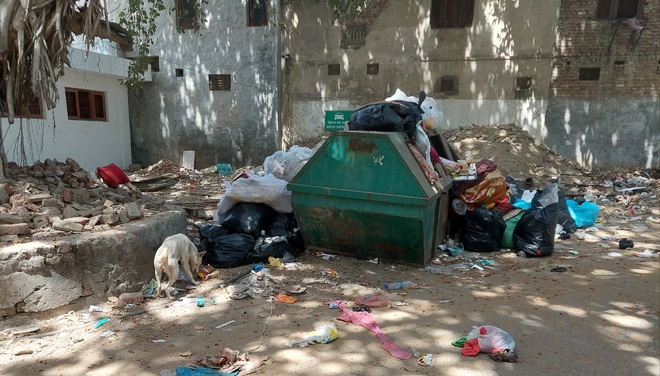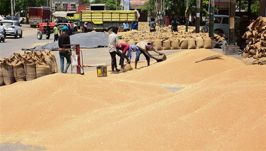
Covid waste dumped by patients at the Jalandhar Civil Hospital.
Ajay Joshi
Tribune News Service
Jalandhar, April 20
In the wake of the surge in the number of Covid-19 cases, it has become difficult for hospitals to manage garbage contaminated with bodily fluids or other infectious materials.
Colour coding: classification of waste
- Red waste: It includes all syringes (without needles), soiled gloves, IV tubes, etc. With the autoclave technology, the red waste is disinfected before being sent for treatment
- Blue waste: All such waste consists of glass, broken or intact
- White waste: Metal wastes, needles, guide wires, etc, are put under the category
- Yellow waste: The waste is incinerated at high temperature
Medical supplies and disposable personal protective equipment (PPE) kits used by health-care workers and patients could be seen piled up on the premises of hospitals. At present, the medical waste generation in hospitals is three times the amount the hospitals would have before the outbreak of the pandemic. The daily output has reached 4.50-5 metric tonnes.
Sarabjit Singh, an official of Rainbow Environments Pvt Ltd that treats bio-medical waste (BMW), stated that Covid waste generation had increased manifold in Jalandhar district, which is considered the hub of hospitals, in the last two months. “In February, the accumulated amount of Covid waste from the hospitals was around 10,520 kg (375 kg per day), which shot up to 18,198 kg in March (587 kg per day). The waste amount was 19,242 kg up to April 18, which means the daily waste generation rose to 1,012 kg,” said Sarabjit.
It is pertinent to mention here that this is not the only company working for the treatment of Covid waste in the city. Though the Covid waste is being generated in large numbers, the regular medical waste generation has reduced.
Owing to the highly infectious nature of the coronavirus, a more sophisticated method of managing the generated waste is being adopted by the hospitals. Apart from establishing testing centres, treatment centres and isolation facilities, the establishment of safe disposal facilities for infectious waste has put extra burden on hospital administrations.
Dr Monika Aggarwal, microbiologist at Patel Hospital, said, “Before disposing the BMW and Covid waste, the hospital staff segregates it into four following categories — red, blue, yellow and white. A large sum was being spent on cleaning and sanitising the waste produced in the hospital.”
Similarly, Dr Manpreet Singh Ghuman, who handles the disposal of waste generated at the Civil Hospital, said, “The production of Covid waste in the hospital has almost doubled. In the months of January, February and March, the wastegenerated at the Civil Hospital was 1,000 kg, 1,100 kg and 1,600 kg, respectively. At present, nearly 60-70 kg waste is being produced on a daily basis in the month of April.”
“Considering the spike in waste generation, the hospital is shortly going to install a separate portion for keeping all bio-medical waste and its treatment. The company lifting the waste from the hospital has also increased the rate by 30 to 40 per cent,” added Ghuman.
Dr Baljit Singh Johal at Johal Hospital said the hospital was paying Rs 1,500 extra for treating Covid waste. “While 1,081.68 kg bio-medical waste was generated in the month of January, it rose to 1,334.63 in February and 1,796.49 in March,” added Dr Johal.
Join Whatsapp Channel of The Tribune for latest updates.



























